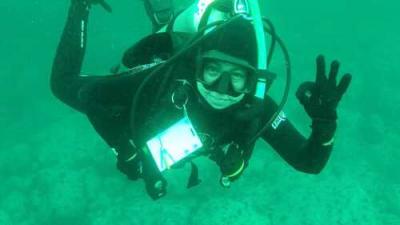California Sea Grant is excited to welcome Meliza Le Alvarado as the new Binational Climate Fellow. In this new two-year role she will work with Indigenous communities, stakeholders and scientists around the San Diego-northern Baja California region with the goal of improving access to coastal resilience research.
Le Alvarado grew up in Ensenada, Mexico, and earned a bachelor’s degree in general biology from the Autonomous University of Baja California. She started working in aquaculture and sustainable seafood but soon moved to conservation and habitat restoration.
After completing her degree, she moved to California and volunteered at the Bolsa Chica Conservancy doing coastal cleanups, invasive species removal and education.
“At that moment, I realized we have an issue with losing habitats not only in Baja California, but also in California,” Le Alvarado said.
She returned to Mexico for a master’s degree in marine ecology from el Centro de Investigación Científica y de Educación Superior de Ensenada, where she used stable isotopes to study the trophic ecology of yellowfin tuna in the Gulf of Mexico.
“It was very far from where I started in the beginning,” Le Alvarado said with a laugh. “I still wanted to work in conservation and coastal resilience.”
For the next few years, Le Alvarado worked with the federal Mexican government and local fishermen to evaluate benthic species like clams and lobsters and conduct kelp forest surveys of sea urchins. She enjoyed working with the fishing communities and learning from their empirical knowledge. Collaborating with communities also revealed how climate change threatens coastal livelihoods.

Through the binational climate fellowship, Le Alvarado will connect communities to scientists and coastal research that will help them plan for and adapt to climate change. Under the guidance of California Sea Grant and the Climate Science Alliance, she will find information gaps and needs within communities, prioritizing Indigenous groups.
The fellowship focuses on the San Diego-Northern Baja California region and considers climate and ecological challenges that cross borders.
“Being a biologist has taught me that we have these artificial borderlines, but actually we share our fauna and flora,” Le Alvarado said. “Our ecoregion is the same.”
She looks forward to getting to know coastal communities and researchers around the area and helping them plan for a resilient future.
Le Alvarado’s fellowship is supported with funding from the Binational Resilience Initiative, a partnership of San Diego Foundation and International Community Foundation.
About California Sea Grant
NOAA’s California Sea Grant College Program funds marine research, education and outreach throughout California. Headquartered at Scripps Institution of Oceanography at the University of California San Diego, California Sea Grant is one of 34 Sea Grant programs in the National Oceanic and Atmospheric Administration (NOAA), U.S. Department of Commerce.